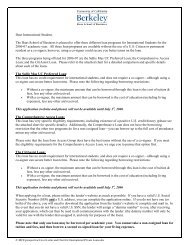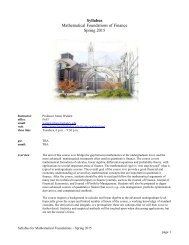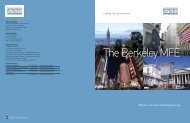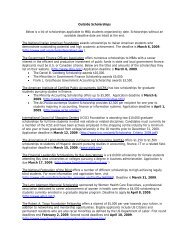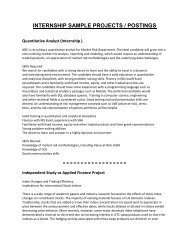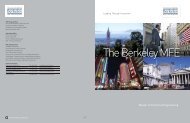Program Guide.c2.3.indd - Master of Financial Engineering Program
Program Guide.c2.3.indd - Master of Financial Engineering Program
Program Guide.c2.3.indd - Master of Financial Engineering Program
- No tags were found...
Create successful ePaper yourself
Turn your PDF publications into a flip-book with our unique Google optimized e-Paper software.
M F E<strong>Master</strong>’s in2007-2008<strong>Financial</strong> <strong>Engineering</strong>Leading Through Innovation<strong>Program</strong> Brochure2007-2008
A Message from the Faculty Director“If I can make it there, I’ll make it anywhere” isa joyful call for confidence from the classic songNew York, New York, and this message rings truefor graduates <strong>of</strong> the Haas School’s <strong>Master</strong>’s in<strong>Financial</strong> <strong>Engineering</strong> (MFE) <strong>Program</strong>.To make this claim a reality, the MFE <strong>Program</strong> brings togetheroutstanding students, acclaimed pr<strong>of</strong>essors, and a demandingcurriculum in the environment <strong>of</strong> one <strong>of</strong> America’s great business schools and universities.Just add the effort to “make it here,” and you will be ready for a happy andrewarding career in financial engineering.The MFE program is one important example <strong>of</strong> Haas’ commitment to Leading ThroughInnovation. Innovation requires knowledge, imagination and commitment. Our programprovides the knowledge and stimulates the imagination. In the end, though, it is up toyou to absorb the knowledge, open your imagination, and commit to your dream.Contents1 Real-World Solutions for<strong>Financial</strong> Problems2 The MFE Experience4 Student Services6 Admissions <strong>Guide</strong>lines8 Employment Report10 MFE Courses12 <strong>Program</strong> Costs14 MFE Faculty16 Frequently Asked Questions17 Other Degree <strong>Program</strong>s17 Campus MapThe students we accept possess the strong quantitative skills required <strong>of</strong> financial engineers.We build on this foundation through a curriculum emphasizing critical economicthinking, capital market dynamics, real-world problem definition, quantitative modeling,and innovative problem solving. With this combination, our students graduate well preparedto meet the challenges <strong>of</strong> global commerce.Our graduates enjoy careers in insurance and investment banking, corporate strategyand risk management, asset structuring, primary and derivative securities’ valuation, quantitativeasset management, hedge fund management, consulting and securities trading.<strong>Financial</strong> engineering is taking its place alongside traditional engineering disciplines as amajor driving force in the global economy. We encourage you to explore the Haas MFEprogram, and to apply for admission.John O’BrienFaculty Director, MFE <strong>Program</strong>Adjunct Pr<strong>of</strong>essor
<strong>Master</strong>’s in <strong>Financial</strong> <strong>Engineering</strong>M F EReal-World Solutions for<strong>Financial</strong> Problems<strong>Financial</strong> engineers play anincreasingly integral role ininvestment banks, commercial banks,and other corporations. Anticipating this needhas been the <strong>Master</strong>’s in <strong>Financial</strong> <strong>Engineering</strong>(MFE) <strong>Program</strong> at the Haas School <strong>of</strong>Business, ranked #1 by Global Derivatives in2004. We are readying a new generation <strong>of</strong>pr<strong>of</strong>essionals to apply theoretical finance andcomputer modeling skills to reduce riskand make informed pricing, hedging, andportfolio management decisions.As a Berkeley MFE student, you learn to thinklike a financial economist and gain in-depthunderstanding <strong>of</strong> the mathematical frameworkthat underlies financial markets. You benefitfrom the application-oriented approach <strong>of</strong>the curriculum—the only MFE curriculumdeveloped completely by a business school.Through the program, you will launch yourcareer having gained experience in handlingstructured products, such as mortgage-backedand asset-backed securities. That experiencecomes not only from coursework, but from ahands-on applied finance project and a ten- totwelve-week internship.Studying at one <strong>of</strong> the nation’s top-rankedbusiness schools also affords access to topnotchresearch tools, career services, andcorporate contacts. We will help you to honeyour job-seeking skills and will work activelyto connect you with employers that can <strong>of</strong>ferchallenging and rewarding internships andfull-time positions.In choosing to pursue an MFE at the HaasSchool <strong>of</strong> Business, you choose a rigorouscourse <strong>of</strong> study delivered by pr<strong>of</strong>essors who arepractitioners as well as dedicated researchers.The program’s small size encourages studentsto learn from each other and its top academicstandards allow for teaching at the highest level.Designed to keep you ahead <strong>of</strong> industry innovations,the Berkeley MFE <strong>Program</strong> positions youto apply quantitative “rocket science” to realworldfinancial problems.Pr<strong>of</strong>ile <strong>of</strong> MFE Students:Class <strong>of</strong> 2007AdmissionsApplications Received: 243Enrolled: 59Enrollment Pr<strong>of</strong>ileCountries Represented: 16Average Age: 29Average Post-University 3.78 yearsWork Experience:Undergraduate Institutions 48Represented:Average Undergraduate GPA: 3.65Graduate Institutions 43Represented:Prior DegreesBachelor’s: 39%<strong>Master</strong>’s: 36%Ph.D.: 24%J.D: 2%Prior Majors<strong>Engineering</strong>: 46%Mathematics: 20%Finance: 12%Computer Science: 7%Economics: 7%Natural Sciences: 3%Business: 2%Humanities: 2%Prior Work ExperienceFinance: 20%Research & Development: 17%Other: 15%<strong>Engineering</strong>: 14%Education: 10%Information Systems: 10%Consulting/ManagementServices: 8%General Management: 2%Marketing/Sales: 2%Planning: 2%Project Management: 0%1
The MFE ExperienceFor more than 100 years,the top-ranked HaasSchool <strong>of</strong> Business hasprepared outstandingindividuals for leadershiproles on the forefront <strong>of</strong>finance, commerce, andindustry. These men andwomen earn a degree thatopens doors around theglobe—a degree from theUniversity <strong>of</strong> California,Berkeley, one <strong>of</strong> the finestinstitutions <strong>of</strong> higher learningin the world. As a pioneerin <strong>of</strong>fering the <strong>Master</strong>’s in<strong>Financial</strong> <strong>Engineering</strong> (MFE)degree, the Haas School isstill one <strong>of</strong> only a handful<strong>of</strong> business schools to <strong>of</strong>ferspecialized study in thisfield that has reinventedfinancial decision making.An Innovative DegreeThe MFE <strong>Program</strong> at the Haas School <strong>of</strong>Business prepares students for technicallysophisticated jobs in investment banks,insurance companies, money managementfirms, hedge funds, treasury departments,diversified financial services companies, andequity/venture capital firms. The programserves students seeking comprehensive technicalknowledge <strong>of</strong> arbitrage, hedging, futures andoptions pricing, portfolio management, trading,and dynamic investment strategies in bond, currency,options, and other financial markets.The MFE requires only one year <strong>of</strong> study,which makes it attractive to students with strongquantitative skills and focused career interests.The MFE may also be seen as an attractivealternative to a doctoral program in finance forindividuals interested in commercial rather thanacademic careers. The combination <strong>of</strong> skills– understanding <strong>of</strong> complex financial strategies,financial modeling ability, and computationalpr<strong>of</strong>iciency – is in high demand, and is difficultfor employers to find in graduates <strong>of</strong> standardMBA or engineering programs. As an MFEstudent, you will learn how to combine modernportfolio theory and computational methodswith a practical knowledge <strong>of</strong> the forums inwhich you can employ these skills.MFE at a Glance• One-year intensive program• Academic year begins every March• Applied finance project• Ten- to twelve-week quantitativefinance internship• Only 60 students enrolled annually• Majority <strong>of</strong> students already hold anadvanced degree• One-quarter <strong>of</strong> students performed inthe 99th percentile <strong>of</strong> the GMAT(or scored 100% on the GRE)Quality InstructionThe MFE faculty is comprised <strong>of</strong> distinguishedfinance instructors from the Haas School<strong>of</strong> Business at UC Berkeley, the AndersonGraduate School <strong>of</strong> Management at UCLA,UC Irvine’s Paul Merage School <strong>of</strong> Business,and UC San Diego’s Rady School <strong>of</strong>Management. The MFE faculty performspreeminent research in quantitative finance,research that feeds directly into the MFE curriculum.Many <strong>of</strong> these scholars also have practicalexperience in the creation <strong>of</strong> financialinstruments and s<strong>of</strong>tware and the implementation<strong>of</strong> innovative financial strategies. Theirexpertise is widely recognized and respected.Competitive AdmissionsThe MFE <strong>Program</strong> <strong>of</strong>fice expects to receive afew hundred applications for the 2007-2008admissions cycle. The 60 students who areenrolled will have a high level <strong>of</strong> intellectualcuriosity, a strong interest in finance, and stronganalytical skills. Though there is no specificdegree requirement, most students will havebackgrounds in quantitative disciplines such asmathematics, statistics, the physical sciences,engineering, operations research, computer science,finance, or economics. It is also expected,though not required, that applicants have workor research experience in which they haveapplied quantitative skills creatively. In orderto screen for candidates who have the ability tosucceed in the program, the admissions committeecarefully reviews all parts <strong>of</strong> an individual’sapplication, including grades, test scores,recommendations, and essays.2
<strong>Master</strong>’s in <strong>Financial</strong> <strong>Engineering</strong>Tailored CurriculumMFE courses are designed exclusively for MFEstudents, and are seamlessly integrated withone another. This cooperation between coursematerial allows the mathematical, statistical, andcomputer science methods to be integratedwith the theoretical framework and institutionalsettings in which they are applied. For example,macroeconomics is taught in the relevantcontext – in the fixed income markets course,during the discussion <strong>of</strong> term structure, andduring the equity and currency markets course,in the context <strong>of</strong> exchange rate determination.Similarly, insurance concepts are introduced inthe advanced derivatives courses where studentscan easily understand their relation to similarproducts – insurance and option contracts.The MFE <strong>Program</strong> requires satisfactory completion<strong>of</strong> 28 units <strong>of</strong> coursework. In addition tocoursework, the MFE educational experienceincludes the following:<strong>Financial</strong> Practice Seminars: MFE studentsare encouraged to attend discussions held byfinance practitioners. In the first term, individualsfrom different facets <strong>of</strong> the financial worlddiscuss the kinds <strong>of</strong> jobs that will be availableto graduates <strong>of</strong> the MFE <strong>Program</strong> and the skillsneeded to contribute to a firm’s mission. In thesecond term, speakers provide insights into theway the financial world is changing: new productsand needs, evolving data and informationsystems, and similar topics.Applied Finance Project: MFE students arerequired to complete an applied finance projectthat develops or uses quantitative finance toolsand techniques acquired in the program orinternship.Internship <strong>Program</strong>: While not required forgraduation, students are encouraged to have aninternship after the third term. The MFE <strong>of</strong>ficeworks with the students to develop internshipopportunities.The MFE CurriculumThe <strong>of</strong>ficial schedule for 2007-2008 is not finalized.Visit our web site at http://mfe.haas.berkeley.edu/curriculum.html for the most up-to-date information.Spring 2007: March - May 2007 (8 weeks)Fundamentals <strong>of</strong> <strong>Financial</strong> Economics Rubinstein(3 units)Empirical Methods in Finance (2 units) ValkanovIntroduction to Stochastic Calculus Instructor TBA(2 units)<strong>Financial</strong> Practice Seminars ISummer 2007: June - August 2007 (8 weeks)Derivatives: Economic Concepts (2 units) RubinsteinDerivatives: Quantitative Methods (2 units) TavellaFixed Income Markets (2 units)LongstaffAccounting and Taxation <strong>of</strong> Derivatives (1 unit) Udpa<strong>Financial</strong> Practice Seminars IIFall 2007: August - October 2007 (22 weeks)Required course:<strong>Financial</strong> Risk Measurementand Management (2 units)Choose 5 units <strong>of</strong> electives:Advanced Computational Finance (2 units)Success and Failure in <strong>Financial</strong>Innovation (1 unit)The Design <strong>of</strong> Securities forCorporate Financing (1 unit)Credit Risk Modeling (2 units)Equity and Currency Markets (2 units)Independent Study (1 - 3 units)Winter 2008: January - March 2008 (8 weeks)Choose 7 units <strong>of</strong> coursework:Asset-backed Security Markets (2 units)Dynamic Asset Management (2 units)Behavioral Finance (2 units)JorionTavellaO’BrienBajajBohnLyons, KahnWallaceand JaffeeLelandOdeanAdvanced Corporate FinanceInstructor TBA(and Real Options) (2 units)Applied Finance Project (required) (1 - 3 units)Independent Study (1 - 3 units)Stantonand WallaceNote: Not all electives are <strong>of</strong>fered every year.Jim Gilliland, MFE 02Previous degreeBS, FinanceUniversity <strong>of</strong> British ColumbiaPrevious positionChief StrategistHSBC Asset Management CanadaCurrent positionHead <strong>of</strong> North AmericanFixed Income InvestmentsSan Francisco“I chose Haas for its worldwide reputationand for the MFE’s business-focusedcoursework in portfolio management,quantitative risk management, anddynamic investment strategies. TheHaas MFE’s unique broad training inapplying quantitative methods enabledme to integrate and build upon my backgroundin finance and mathematics.”3
Admissions <strong>Guide</strong>linesAndrei Ionascu, MFE 06<strong>Financial</strong> <strong>Engineering</strong> Student Association(FESA) PresidentPrevious degreeBA, Economics and MicrobiologyUniversity <strong>of</strong> California, BerkeleyPrevious positionConsultantAccentureSan FranciscoMFE internshipAssociate, Structured Credit ProductsAnalytics GroupWachovia SecuritiesCharlotte, NCCurrent positionAssociate, Structured Credit Products(cash and synthetic CDOs)Wachovia SecuritiesCharlotte, NC“The MFE <strong>Program</strong> <strong>of</strong>fers perhapsthe most comprehensive immersionin the science <strong>of</strong> capital marketsfinance available today. The mainthrust <strong>of</strong> this program comes fromthe fact that it prepares students tonot only understand the conceptspresented, but also to use programming,mathematics, statistics, andfundamental derivatives theory toactually price instruments as wellas to have the capacity to engineernew exotic products.”The MFE degree at the Haas School can becompleted in 12 months <strong>of</strong> full-time coursework.Applications are accepted year-round,and 60 students are enrolled each year. Theprogram begins and ends only in the spring,and is not available part-time.The MFE <strong>Program</strong> no longer sends paperapplications through the mail.For the MFE application and detailed instructions,visit http://mfe.haas.berkeley.edu.Graduate Division Admissions Requirements• Valid degree from an accredited institution,comparable to the four-year bachelor’s degreefrom Berkeley• Sufficient training to undertake graduatestudy in the chosen field• A satisfactory scholastic average, usuallya minimum <strong>of</strong> 3.0 in upper-division workInternational applicants: Please refer to theweb site for full requirements.MFE Admissions Requirements• Graduate Management Admission Test(GMAT) or the Graduate RecordExaminations (GRE) General Test• A strong quantitative backgroundincluding linear algebra, multivariatecalculus, differential equations, numericalanalysis, and advanced statistics andprobability• Prior experience in computer programming(examples: Visual Basic, Matlab, C, C++)and familiarity with computers as a computationaland management tool• Excellent writing, speaking and presentationability in EnglishMFE Admissions Recommendations• Work or research experience in a quantitativediscipline• Experience with statistical and econometricapplications (examples: SAS, Gauss, RATS,S-Plus, Garch)• Experience with mathematical tools(examples: MatLab, Mathematica, orMathCad)• Graduate Record Examinations (GRE)Math Subject TestIn some cases, applicants may be admitted conditionallyon the successful completion <strong>of</strong> one or more recommendedcourses before enrollment in the program.Application Deadlines & Review ScheduleFor the academic year beginning March 2008Completed application Application willreceived by:be reviewed by:January 17, 2007 March 2, 2007March 25, 2007 May 25, 2007June 22, 2007 September 26, 2007October 1, 2007 December 3, 2007GMAT or GRE: We require that applicantstake either the GMAT or GRE. All GMAT andGRE scores are valid for five years and shouldnot be older than April 1, 2003. When orderingGRE reports, applicants should use institutioncode 4833 and department code 4399. ForGMAT, use institution code 4769. Please notethat beginning January 3, 2006, GMAT will beusing a new program code: N2V-PT-87.Letters <strong>of</strong> Recommendation: We require twoletters <strong>of</strong> recommendation. Letters shouldcome from individuals who are familiar with6
Employment Report2006 Full-TimeStatistics• 98% <strong>of</strong> graduates sought employmentafter graduation. (58/59)• 97% <strong>of</strong> graduates who soughtemployment received a full-time<strong>of</strong>fer within 3 months <strong>of</strong> graduation.(56/58)Base SalaryAverage: $98,068Median: $95,000Signing / First-Year Bonuses*Average: $54,244Median: $54,750First-Year CompensationAverage: $152,313Median: $152,500* includes guaranteed and not guaranteedbonusesJob Industries Consulting 5%Trading 9%Credit Risk 5%StructuredProducts/Derivatives17%Strategy 17%Sales & Trading 2%Job FunctionsInvestmentBanking &Brokerage52%Risk Management 5%Insurance 2%<strong>Financial</strong> S<strong>of</strong>tware 4%Entrepreneur 7%Equity Research 2%Fixed Income17%Investment Banking 5%Other 4%Portfolio Management 5%Commercial Banking10%Consulting,InvestmentResearch/Advisory 12%AssetManagement20%Full-time Employers <strong>of</strong>MFE GraduatesAXA Rosenberg InvestmentManagement Ltd.Barclays Global InvestorsBear StearnsBlackrockBloombergBNP ParibasCitigroupCredit Derivatives Research (CDR)Deutsche Bank Asset ManagementDow JonesFair Isaac CorporationFannie MaeFederal Home Loan Bank <strong>of</strong>San FranciscoFitch RatingsGoldman Sachs & Co.JP MorganJP Morgan TokyoKPMGLaSalle Bank CorporationLehman BrothersMellon Capital ManagementMerrill LynchMillimanMoody’s KMVMorgan StanleySAC Capital AdvisorsWachovia SecuritiesWells Fargo BankWorld Bank Group (IFCInternational Finance Corp.)WR Hambrecht LLC.Job Locations Japan 4%East Coast60%West Coast34%8Midwest 2%
<strong>Master</strong>’s in <strong>Financial</strong> <strong>Engineering</strong>“One very important aspect<strong>of</strong> the Haas MFE is the overallemphasis on teamwork.”Yousuf AbbasiMFE 230Q – Introduction to Stochastic Calculus (andNumerical Methods in Finance). This course presents theconcepts and tools <strong>of</strong> stochastic calculus as requiredfor effective pricing <strong>of</strong> complex financial derivatives incontinuous time, and introduces the fundamentals <strong>of</strong>elementary numerical analysis. The course stressesthe practical applications <strong>of</strong> stochastic differentialequations, Ito integrals, and measure transformationsas required for advanced financial engineering practiceand understanding <strong>of</strong> asset pricing theory.MFE 230R – Advanced Computational Finance. Thiscourse is a deeper analysis <strong>of</strong> numerical and computationalissues in pricing and calibration, and buildson the techniques learned in Derivatives: QuantitativeMethods. Emphasis is on hands-on case projects withheavy use <strong>of</strong> computational techniques.MFE 230S – Behavioral Finance. This course coverselements <strong>of</strong> behavioral decision theory and its implicationin financial markets. Focus is on the psychologicalprocesses by which people make judgmentsand decisions, and the heuristics and biases associatedwith these decisions.MFE 230V – Credit Risk Modeling. The course providesexposure to the practical challenges associated withbuilding and testing credit risk models for use bybanks and asset managers. Emphasis is placed onmodel building, model valuation, and interpretingmodel output.MFE 230W – Accounting and Taxation <strong>of</strong> Derivatives. Thebroad purpose <strong>of</strong> this course is to help financial engineersunderstand the implications <strong>of</strong> the innovativefinancial instruments that they construct on firms’financial statements and tax liability.Practice Seminars I and II. These weekly seminars featureguest speakers from financial services firms todiscuss the work <strong>of</strong> financial engineers in their firmsand the kinds <strong>of</strong> skills and personal attributes theyare seeking for this work, trends in the provision <strong>of</strong>financial services, the information and computingsystems being adopted, new product developments,regulatory issues, and similar topics.Interns, CitigroupYousuf Abbasi(left)Previous degreeBS, MathematicsUniversity <strong>of</strong> Central ArkansasMFE internshipHybrid analystFixed Income Strategy and Analytics (FISA)“One very important aspect <strong>of</strong> the Haas MFE isthe overall emphasis on teamwork. The manyteam projects assigned in the curriculum giveyou the opportunity to interact and collaboratewith some <strong>of</strong> the brightest classmates, and theopportunity to develop relationships that willlast a lifetime.”Haochuan Zhang(second from left)Previous degreesB.Eng., <strong>Engineering</strong> MechanicsTsinghua University, ChinaMS, Aerospace <strong>Engineering</strong>Georgia TechPh.D., Mechanical <strong>Engineering</strong>University <strong>of</strong> California at BerkeleyMFE internshipAssociateFixed Income Strategy and Analysis“Having strong intuition is critical for a successfulcareer in financial engineering. TheBerkeley MFE program strikes a perfect balancebetween building this intuition and furtherdeveloping your quantitative skills.”Amit Goyal, MFE 07(center)Previous degreesB Eng, M. Eng., Biochemical <strong>Engineering</strong>and BiotechnologyIndian Institute <strong>of</strong> Technology, DelhiMS, Environmental <strong>Engineering</strong>Carnegie Mellon UniversityPh.D., Environmental <strong>Engineering</strong>Carnegie Mellon UniversityMFE internshipAssociateFixed Income Strategy and Analysis“One <strong>of</strong> the most important features, indeed,the feature that sets the Berkeley MFE apart,is the curriculum. It adapts very quickly to thelatest financial innovations, providing not onlynecessary exposure, but also helping studentsto develop pr<strong>of</strong>iciency in cutting edge tools andtechnologies used in practice.”Peng Gong, MFE 07(second from right)Previous degreesBS, Polymer Science and <strong>Engineering</strong>University <strong>of</strong> Science and Technology <strong>of</strong> ChinaPh.D., Physical ChemistryPurdue UniversityMFE internshipAssociateFixed Income“I am pleasantly surprised by the networkingopportunities available through the MFE program.Choosing Haas has allowed me to benefitfrom an alumni network that will be priceless inmy future career.”Swaroop Yalla(right)Previous degreesB.Eng, Civil <strong>Engineering</strong>Indian Institute <strong>of</strong> Technology, New DelhiPh.D., Mechanical <strong>Engineering</strong>University <strong>of</strong> Notre DameMFE internshipAssociateFixed Income Strategy and Analytics“From hurricanes to financial ‘earthquakes,’ virtuallyevery business function is tied to assessingrisk, a trend that will precipitate increasinglycomplex structured products in the financialmarkets. The Haas MFE program places itsgraduates right in the midst <strong>of</strong> this innovation; italso provides them with a solid knowledge base,allowing the students to roll up their sleeves anddevelop products from the ground up.”David Dickson(not pictured)Previous degreesBS, MathematicsUniversity <strong>of</strong> Warwick (UK)MFE internshipAssociateForeign Exchange“Haas MFE students are increasingly beingplaced with top-tier institutions that provide greatplatforms from which to forge your career pathwithin the industry. Searching for alpha froma high-frequency database on Citigroup’s FXtrading floor has been one <strong>of</strong> the highlights andchallenges <strong>of</strong> my internship. Clearly, this programhas far exceeded my expectations. I am now ableto quantify my financial ideas in a very pr<strong>of</strong>itableway. I recommend that all quantitatively mindedpeople in the industry take advantage <strong>of</strong> whatthe Berkeley MFE has to <strong>of</strong>fer.”11
<strong>Program</strong> CostsCourtney Walker, MFE 07Previous degreeBS, Applied MathematicsColumbia UniversityMFE internshipCDO StructurerBarclays CapitalNew York“In my opinion, the greatest strength<strong>of</strong> the program is the caliber <strong>of</strong> thefaculty, who not only effectivelycommunicate fundamental financialconcepts but are <strong>of</strong>ten pioneers inthe industry itself.”Each year Berkeley’s <strong>Financial</strong> Aid Office estimatesthe average cost for a graduate studentduring the academic year. This budget is thebasis for determining financial aid eligibility.You may use the chart below (adjusted for a12-month program) to estimate the cost <strong>of</strong>attending the MFE <strong>Program</strong>. As these <strong>of</strong>ficialfigures are averaged for all UC Berkeley students,actual costs, especially housing costs,may be higher.Tuition $46,500*University Health Insurance $1,758*Housing and Utilities $13,494*Food $6,921*Books, Supplies $3,750*Personal $4,347*Transportation $2,007*Miscellaneous Fees $3,065*(class pass fee, summer session fee,campus fee, and others)Total Estimated Expenses (12 months) $80,842** all costs are subject to changeComputer CostsMFE students are required to have their ownpowerful laptop computer. Various manufacturers<strong>of</strong>fer students discounts at the Scholar’sWorkstation, the campus computer store. Tocontact the Scholar’s Workstation, please call510-642-8424 or visit their web site at http://www.tsw.berkeley.edu.<strong>Financial</strong> AidThe MFE <strong>Program</strong> does not <strong>of</strong>fer scholarshipsor grants. All assistance is in the form <strong>of</strong> loanswhich must be repaid after graduation or droppingbelow 6 units. Due to the nontraditionalacademic calendar <strong>of</strong> the MFE <strong>Program</strong>, studentsmust file two loan applications for the fullMFE <strong>Program</strong>.MFE Spring Term 2007 and MFE SummerTerm 2007:• Students who are citizens or permanentresidents <strong>of</strong> the United States should applyfor federal loans via the 2006-2007 FAFSA(Free Application for Federal Student Aid)at http://www.fafsa.ed.gov no sooner thanJanuary 1, 2006.• International students with a creditworthy UScitizen or US permanent resident co-signercan apply for a private loan no sooner than90 days before March 2007 classes begin.Information is at http://www.haas.berkeley.edu/MBA/finaid/prvtmba.html.Federal Direct LoansUS citizens and US permanent residents canfinance their education through the FederalDirect Loan <strong>Program</strong>. Up to $18,500 for everysemester (equal to two MFE terms) may beborrowed. Students demonstrating financialneed can borrow $8,500 <strong>of</strong> this amount as asubsidized loan (no interest is charged whilethe student is in school) and $10,000 in anunsubsidized loan (interest is charged whilethe student is in school). Those who do notdemonstrate financial need can borrow thefull $18,500 in an unsubsidized loan.Eligibility is based on student status and cost <strong>of</strong>education as determined through the FAFSAprocess, not credit history. The interest rate isvariable annually and is based on the 91-day USTreasury bill. Repayment is made over a 10- to25-year term with no prepayment penalty. Visithttp://www.ed.gov/DirectLoan/about.htmlfor any updates.12
<strong>Master</strong>’s in <strong>Financial</strong> <strong>Engineering</strong>Private LoansAll students are eligible to apply for privateloans, which are <strong>of</strong>fered based on creditworthiness,not financial need. You should obtaincopies <strong>of</strong> and verify the accuracy <strong>of</strong> your creditreports before applying for a private loan. Oneoption for this is http://www.annualcreditreport.com. The interest rates on these loans are usuallyhigher, so students typically pursue thisoption last. Rates and fees may be credit-tieredand can be based on the Prime Rate or on the3-month LIBOR (London Interbank OfferedRate). International students may qualify forprivate loans if they have a creditworthy UScitizen or US permanent resident as a co-signer.Through private loans, a student may be ableto borrow up to the annual cost <strong>of</strong> education,which includes living expenses and registrationfees. For more information, visit the Haas<strong>Financial</strong> Aid Office, or go to http://www.haas.berkeley.edu/MBA/finaid/prvtmba.html.Haas <strong>Financial</strong> Aid OfficeThe <strong>Financial</strong> Aid Office provides assistance inresolving financial aid/billing problems, andobtaining private student loan information andapplications. The <strong>of</strong>fice is located in RoomS420K <strong>of</strong> the Student Services Building. To gethelp from a Haas financial aid counselor, call510-643-0183 or e-mail finaid@haas.berkeley.edu.The Haas <strong>Financial</strong> Aid staff is your point<strong>of</strong> contact, rather than the central financialaid <strong>of</strong>fice.HousingBerkeley graduate students live in both universityand <strong>of</strong>f-campus housing. Housing in theBerkeley area is expensive and <strong>of</strong>ten in shortsupply, so you should plan ahead to ensure thatyou will have a place to live before classes begin.If you are interested in applying for universityhousing, do not wait for notice <strong>of</strong> admission toseek information. For more information, visithttp://www.housing.berkeley.edu/housing.The Community Living OfficeThe <strong>of</strong>fice provides rental listings and counselingfor students seeking <strong>of</strong>f-campus housing.For more information, visit http://www.housing.berkeley.edu/housing or go to the CommunityLiving Office at 2535 Channing Way. Bring yourletter <strong>of</strong> admission and photo identification.International House (I-House)This residence and program center housesmore than 600 students, many <strong>of</strong> whom are atthe graduate level. You do not have to be aninternational student to live at the I-House,which is less than a five-minute walk to Haas.For more information, visit the InternationalHouse Residence Office at 2299 PiedmontAvenue, #2320, Berkeley, CA 94720-2320 orcall 510-642-9490.University Family Student HousingThis housing is available for students who aremarried and/or have children. Rent for familystudent housing is less expensive than forcomparable <strong>of</strong>f-campus housing, so thereis a waiting list. For more information, visithttp://www.housing.berkeley.edu/livingatcal/studentsfamilies.html.The University Child Care <strong>Program</strong>Child care accredited by the National Academy<strong>of</strong> Early Childhood <strong>Program</strong>s, is available forchildren ages 3 months to 7 years old, and paymentis on a sliding scale. At least one parentmust be a registered UC Berkeley student. Formore information, visit http://www.housing.berkeley.edu/child/families/.Luca Barone, MFE 05Previous degree<strong>Master</strong>s in Economics and FinanceLuiss Guido Carli University, RomeCurrent positionExotic Credit Derivatives Sales Strategist,F.I.C.C.“The theory we learnd from Pr<strong>of</strong>essorMark Rubinstein and his colleaguesdeals with state-contingent claims,the elementary particles <strong>of</strong> ‘nuclearfinancial economics.’ This theory isespecially useful for practitionersbecause it provides a productiontechnology for duplicating the pay<strong>of</strong>fs<strong>of</strong> any contingent claim by using anappropriate dynamic strategy. It canalso be used to solve the inverseproblem <strong>of</strong> inferring risk-neutralprobabilities from the simultaneouslyobserved prices <strong>of</strong> options andother derivatives.”Apply online:http://mfe.haas.berkeley.edu/applications.html13
Faculty <strong>of</strong> the <strong>Master</strong>’s in<strong>Financial</strong> <strong>Engineering</strong> <strong>Program</strong>Mukesh Bajaj, Managing Director <strong>of</strong> Financeand Damages Practice and Board <strong>of</strong> Directors,LECG, LLC. Ph.D. (finance), University <strong>of</strong>California, Berkeley. Corporate finance and financialstrategy, dividend policy, capital and ownershipstructure, determinants <strong>of</strong> stock returns,design and pricing <strong>of</strong> securities.Jonathan Berk, Harold Furst AssociatePr<strong>of</strong>essor <strong>of</strong> Management Philosophy andValues and Finance Group Chair. Ph.D.(finance), Yale University. Asset pricing, firm valuation,the size effect, real investment, and valuingstartups. Associate at Goldman Sachs from 1985to 1987.Jeffrey Bohn, Managing Director, <strong>Financial</strong>Strategies Division, Shinsei Bank. Ph.D.(finance), University <strong>of</strong> California, Berkeley.Risky debt valuation, credit derivatives,banking, risk management, and globalportfolio management.Pierre Collin-Dufresne, Associate Pr<strong>of</strong>essor<strong>of</strong> Finance. Ph.D. (finance), HEC School<strong>of</strong> Management. Continuous Time Finance,Advanced Debt Markets, Term Structure Theory,and Credit Derivatives.Gregory Duffee, Assistant Pr<strong>of</strong>essor. Ph.D.(economics), Harvard University. pricing and tradingcredit risk (theoretical and empirical), termstructuremodeling, risk management <strong>of</strong> financialinstitutions. Formerly a member <strong>of</strong> the TradingRisk Analysis group at the Federal Reserve Board.Mark Garman, Pr<strong>of</strong>essor Emeritus. Ph.D.(systems and communications sciences),Carnegie Mellon University. Arbitrage, options,volatility measures, duration-related risk measures.President and Chief Scientist <strong>of</strong> <strong>Financial</strong><strong>Engineering</strong> Associates, Inc., a provider <strong>of</strong> s<strong>of</strong>twarefor derivatives and value-at-risk analysis.Christopher A. Hennessy, Assistant Pr<strong>of</strong>essor.Ph.D. (economics), Princeton University.Agency costs <strong>of</strong> debt finance, taxes andcorporate risk management, contract theory,and investment distortions.Dwight M. Jaffee, Willis H. Booth Pr<strong>of</strong>essor<strong>of</strong> Banking & Finance. Ph.D. (economics),Massachusetts Institute <strong>of</strong> Technology. Loan activities<strong>of</strong> financial institutions, commercial loan andmortgage markets, credit rationing, asset-backedsecurity markets, catastrophe insurance financing.Board <strong>of</strong> Directors Barr Rosenberg MutualFunds; Visiting Scholar, Federal Reserve Bank <strong>of</strong>San Francisco.Philippe Jorion, Pr<strong>of</strong>essor <strong>of</strong> Finance and ViceDean, University <strong>of</strong> California, Irvine. Ph.D.(finance), University <strong>of</strong> Chicago. Risk management,international finance, global asset allocation.Author, Value at Risk: The New Benchmark forManaging <strong>Financial</strong> Risk. Editor, Journal <strong>of</strong> RISK.Ronald N. Kahn, Managing Directorand Global Head <strong>of</strong> Equity Research, BarclaysGlobal Investors. Ph.D. (physics), HarvardUniversity. Portfolio management, risk modeling,and quantitative analysis. Author (withRichard Grinold), Active Portfolio Management:Quantitative Theory and Applications.Hayne Leland, Arno A. Rayner Pr<strong>of</strong>essor <strong>of</strong>Finance and Management. Ph.D. (mathematicaleconomics), Harvard University. Dynamicinvestment strategies and portfolio insurance,informational asymmetries, structure, and intermediationin financial markets, regulation <strong>of</strong>insider trading, risky debt valuation. Director andfounding principal <strong>of</strong> the investment firm LelandO’Brien Rubinstein Associates Inc. Past president<strong>of</strong> the American Finance Association.Francis Longstaff, Pr<strong>of</strong>essor, University<strong>of</strong> California, Los Angeles. Ph.D. (finance),University <strong>of</strong> Chicago. C.P.A., C.F.A. Term structuretheory, fixed income derivative valuationand risk management, the impact <strong>of</strong> liquidity onthe valuation <strong>of</strong> securities. Head <strong>of</strong> Fixed IncomeDerivative Research, Salomon Brothers Inc. from1995 to 1998. Board <strong>of</strong> Directors, Simplex RiskManagement.14
<strong>Master</strong>’s in <strong>Financial</strong> <strong>Engineering</strong>Richard K. Lyons, Pr<strong>of</strong>essor <strong>of</strong> Finance.Ph.D. (economics), Massachusetts Institute <strong>of</strong>Technology. Foreign exchange markets: volatility,volume, high frequency dynamics, and dealerbehavior; micro-institutional approach to foreignexchange; transparency in dealership markets.Trustee for Matthews International Funds.John O’Brien, Adjunct Pr<strong>of</strong>essor. MS. (operationsresearch), University <strong>of</strong> California, LosAngeles. Faculty Director, <strong>Master</strong>’s in <strong>Financial</strong><strong>Engineering</strong> <strong>Program</strong>. Managing Director at CreditSuisse Asset Management (CSAM). C<strong>of</strong>ounder,chairman, and CEO <strong>of</strong> the investment firm LelandO’Brien Rubinstein. C<strong>of</strong>ounder and original chairman& CEO <strong>of</strong> Wilshire Associates (originallynamed O’Brien Associates).Terrance Odean, Associate Pr<strong>of</strong>essor. Ph.D.(finance), University <strong>of</strong> California, Berkeley.Behavioral finance.Mark Rubinstein, Paul Stephens Pr<strong>of</strong>essor <strong>of</strong>Applied Investment Analysis. Ph.D. (finance),University <strong>of</strong> California, Los Angeles. Optionsmarkets, dynamic investment strategies, optionpricing theory, exotic options, implied binomialtrees, portfolio management s<strong>of</strong>tware. Winner<strong>of</strong> nine prizes for papers in financial economics;1995 <strong>Financial</strong> Engineer <strong>of</strong> the Year. Co-author <strong>of</strong>Options Markets and author <strong>of</strong> the innovative andcomprehensive text, Derivatives: A PowerPlusPicture Book. Founding principal <strong>of</strong> the investmentmanagement firm Leland O’Brien RubinsteinAssociates. Past president <strong>of</strong> the AmericanFinance Association. Advisor on derivatives to theSEC, the CBOE and other exchanges, and numerousfinancial firms.Richard Stanton, Associate Pr<strong>of</strong>essor. Ph.D.(finance), Stanford University. Mortgage markets—prepaymentmodeling, valuation andhedging, term structure modeling and valuation <strong>of</strong>derivative securities, application <strong>of</strong> nonparametricestimation techniques to the hedging andpricing <strong>of</strong> derivatives.Domingo Tavella, Principal <strong>of</strong> OctantiAssociates, Inc., Ph.D. (engineering), StanfordUniversity. Computational methods in financialpricing, stochastic simulation in finance andinsurance, financial s<strong>of</strong>tware developmentstrategies and methods, risk managementstrategies in finance and insurance, hybridinsurance structures.Suneel Udpa, Lecturer. Ph.D. (accounting),Washington University, St. Louis. Evaluating ASPsand reducing costs through outsourcing.Rossen Valkanov, Assistant Pr<strong>of</strong>essor. Ph.D.UC San Diego’s Rady School <strong>of</strong> Management(economics), Princeton University. Empiricalasset pricing, econometrics, macroeconomics,term structure modeling, properties <strong>of</strong> longhorizonreturns.Nancy E. Wallace, Pr<strong>of</strong>essor and Real EstateGroup Chair. Ph.D. (urban and regionalplanning), University <strong>of</strong> Michigan. Mortgagecontract design, mortgage prepayment andvaluation models, asset-backed securitizationand pricing, real estate price dynamics, realoptions in real estate.Mark RubinsteinPaul H. Stephens Pr<strong>of</strong>essor <strong>of</strong> AppliedInvestment AnalysisMark Rubinstein is best known for hiswork on the binomial options pricingmodel (also known as the Cox-Ross-Rubinstein model) and his work onasset pricing in the 1970s. His currentresearch interests include derivativesand asset pricing, and the history <strong>of</strong>the financial theory <strong>of</strong> investments. Hismost recent published papers include aspirited defense <strong>of</strong> rational financial marketsand several papers on the history<strong>of</strong> various fundamental ideas in financialeconomics. Author <strong>of</strong> Options Marketsand Derivatives: A PowerPlus PictureBook, he is a frequent contributor toleading finance and economic journals,and the inventor <strong>of</strong> Rubinstein’s OptionsCalculator, which allows users to quicklyand easily value a wide variety <strong>of</strong> derivatives.He is currently associate editor <strong>of</strong>:• Journal <strong>of</strong> Portfolio Management• Advances in Futures andOptions Research• Journal <strong>of</strong> <strong>Financial</strong> Research• <strong>Financial</strong> Analysts Journal• Journal <strong>of</strong> Derivatives• Review <strong>of</strong> Derivatives Research• Journal <strong>of</strong> RISKRubinstein has won numerous prizesand awards for his research and writing,including International <strong>Financial</strong>Engineer <strong>of</strong> the Year for 1995. In 1993,he served as president <strong>of</strong> the AmericanFinance Association. He earned his ABin economics from Harvard, an MBA infinance from Stanford, and his Ph.D. infinance from the University <strong>of</strong> Californiaat Los Angeles.15
Frequently Asked QuestionsMFE SteeringCommitteeThe active participation <strong>of</strong> membersfrom industry is essential to ensuringthat graduates <strong>of</strong> the MFE <strong>Program</strong>have the requisite skills to be successfulin their future careers. The MFESteering Committee is composed <strong>of</strong>finance faculty and prominent members<strong>of</strong> the financial risk managementcommunity. The committee acts in asimilar capacity as a board <strong>of</strong> trustees,focusing on the curriculum and strategicgoals <strong>of</strong> the MFE <strong>Program</strong>.2006-2007 MembersJohn O’Brien, MFE Faculty DirectorLinda Kreitzman, MFE ExecutiveDirectorArmen Avanessians, Goldman SachsTerry Benzschawel, CitigroupGifford Fong, Gifford Fong AssociatesJim Gilliland, Barclays Global InvestorsJoseph Langsam, Morgan StanleyChuck Lucas, AIGDavid Modest, JPMorganScott PinkusMark Rubinstein, Pr<strong>of</strong>essor, UC BerkeleyAamir Sheikh, Merrill LynchErol Hakanoglu, Goldman SachsRichard Lyons, Pr<strong>of</strong>essor, UC BerkeleyVictor Masch, AIGMFE <strong>Program</strong> SponsorsSpecial thanks to these firms whosedonations help maintain the MFElaboratories.Founding SponsorsAIG Inc.Barclays Global InvestorsBARRA Inc.Gifford Fong AssociatesGoldman SachsMoody’s KMVMBIA Inc.Morgan StanleyQuantal International Inc.The Dean Witter FoundationWachovia SecuritiesWR Hambrecht + Co, LLCSponsorsAXA Rosenberg InvestmentManagement LLCBank <strong>of</strong> America Corp.Bloomberg LPFair, Isaac and Company, Inc.GW Miller FoundationThe Pinkus FoundationFor the full list, visit http://mfe.haas.berkeley.edu/faqs.html.What careers has the MFE led to?Recent graduates have found employment inrisk management, fixed income, structuredproducts derivatives, credit risk, market risk,consulting, corporate finance and financialprogramming. For more detailed informationplease visit our web site at http://mfe.haas.berkeley.edu/faq39.html.What are the differences betweenthe MBA <strong>Program</strong> or Ph.D. <strong>Program</strong>and the MFE <strong>Program</strong>?Please visit our web site at http://mfe.haas.berkeley.edu/faq6.html.Is work experience required?Work or research experience in a quantitativefield is recommended, but not required.Students in our 2006-2007 class had an average<strong>of</strong> almost four years <strong>of</strong> work experience beforejoining the program.What is the academic calendar?The <strong>of</strong>ficial schedule for 2007-2008 isnot finalized. Please visit our web site athttp://mfe.haas.berkeley.edu/curriculum.htmlfor the most up-to-date information.When are the application deadlines for theprogram year 2007-2008?The program admits students over fourdeadlines: January 17, 2007; March 17, 2007;June 23, 2007; and October 1, 2007.Applications received after October 1, 2007 willbe reviewed on a space-available basis. Classesbegin in March 2008.How many people do you admitat each deadline?We only admit the best candidates at eachdeadline. Students may be placed on hold orwait-listed at any time during the admissionsprocess, whether or not there is still space availablein the class. Because there are only 60 spotsavailable, we admit students until we have 60who have committed to attend.Do you recommend preparatory classes?For students who have not taken math, statistics,or financial programming courses in more thanthree years, we do recommend our refreshercourses in order to excel in the program. If youare required to take a pre-program course aspart <strong>of</strong> conditional acceptance to the program,we will accept grades from any accreditedcollege or university. We <strong>of</strong>fer courses infoundation math, statistics, and financialprogramming at UC Berkeley and online.For details visit http://mfe.haas.berkeley.edu/preprogram.html.Where do I order GMAT/GRE reports?Please visit http://www.ets.org for informationon taking GRE and http://www.mba.com/TaketheGMT for information on taking theGMAT test and ordering reports.Is the MFE <strong>Program</strong> <strong>of</strong>fered part-time?No.Are fellowships, scholarships, orassistantships available?There are no fellowships, scholarships, orassistantships associated with the MFE <strong>Program</strong>.For information on UC Berkeley GraduateDivision awards and fellowships visit http://www.grad.berkeley.edu/admissions/pdf/guide_support.pdf.For updated information on financialaid, please see our website at http://mfe.haas.berkeley.edu/faid.Do you <strong>of</strong>fer financial aid?Federal financial aid in the form <strong>of</strong> loans isavailable for most students. See page 12 fordetails, or visit http://mfe.haas.berkeley.edu/faid.html.16
Other Educational<strong>Program</strong>s at theHaas SchoolFull-time MBA <strong>Program</strong>The Full-time MBA <strong>Program</strong> is atwo-year program during the daywith approximately 480 students.Although different application materialsare required, the Full-time andEvening & Weekend MBA programsshare the same curriculum, faculty,and admission standards.Evening & WeekendMBA <strong>Program</strong>Three-year, part-time program forworking pr<strong>of</strong>essionals. Offeredon campus and in Silicon Valley.Ranked in the top three in the US.Berkeley - Columbia ExecutiveMBA <strong>Program</strong>Earn two MBA degrees simultaneouslyover 19 months from the HaasSchool <strong>of</strong> Business and ColumbiaBusiness School. For experiencedexecutives.Ph.D. <strong>Program</strong>For students who desire an academiccareer by preparing them toadvance theory and knowledgein the disciplines underlying thepractice <strong>of</strong> business.Undergraduate <strong>Program</strong>Two-year bachelor’s program forjuniors and seniors. Ranked amongthe top three US programs.Executive EducationHelps individuals, teams, and entireorganizations achieve their goalsthrough customized programs andopen enrollment courses taughtby Berkeley faculty at the workplaceor on campus.Because the faculty and administration <strong>of</strong> the Haas School <strong>of</strong> Business are continually reviewing the MFE<strong>Program</strong> to give its students the best possible educational experience, the school reserves the right to change atany time any <strong>of</strong> its provisions, statements, policies, curricula, procedures, regulations, or fees.NONDISCRIMINATION POLICY STATEMENTThe University <strong>of</strong> California, in accordance with applicable federal and state law and University policy, prohibits discrimination, including harassment,on the basis <strong>of</strong> race, color, national origin, religion, sex, physical or mental disability, medical condition (cancer-related or genetic characteristics),ancestry, marital status, age, sexual orientation, citizenship, or status as a covered veteran (special disabled veteran, Vietnam-era veteran orany other veteran who served on active duty during a war or in a campaign or expedition for which a campaign badge has been authorized). Thisnondiscrimination policy covers admission, access, and treatment in University programs and activities.Inquiries may be directed as follows: Sex discrimination and sexual harassment: Nancy Chu, Title IX Compliance Officer, 1-510-643-7985.Disability discrimination and access: Ed Rogers, A.D.A./504 Compliance Officer, 1-510-643-5116 (voice) or 1-510-642-3172 (TTY).Other inquiries may be directed to the Academic Compliance Office, 200 California Hall, #1500, 1-510-642-2795.Marketing andCommunicationsRich KurovskyCraig KaufmanDesignCuttriss & HambletonPhotographyJim BlockEd CaldwellPrinterFong & FongCAMPUS SAFETYIn accordance with the Jeanne Clery Act, the University maintains a reference guide <strong>of</strong> safety information and procedures, annual campuscrime statistics, and emergency-disaster preparedness information. For a copy <strong>of</strong> this report, Safety Counts, call (510) 643-6442, e-mailucpolice@uclink.berkeley.edu, or write the Police Department Campus Safety <strong>Program</strong>s, University <strong>of</strong> California, Berkeley, Police Department,1 Sproul Hall #1199, Berkeley, CA 94720-1199. The report is also posted on the UC Berkeley Police Department web site.Copyright© 2007,UC Regents.All rights reserved.
M F EPOIPacificOceanNS ETA SHROE YRE SEDalyCitySan280FranciscoInternationalAirportMillbrae92N AT I O NA35L1SanMateoSanRafaelSanFranciscoS I L IGoldenGateBridgeC9O280SouthSanFrancisco101N101OaklandInternationalAirport 880SanFranciscoBayRedwoodCityDumbartonBridgeVSunnyvalePetalumaRichmondSanRafael 580BridgeOaklandBayBridgeSanMateoBridgePaloAltoMountainViewA8580L L101E YSantaClara101Novato37RichmondBerkeley13Alameda2378092SanJoseInternationalAirportSanPabloBayOakland84SanLeandro880580SanJose80HaywardPleasantonFremontMilpitasSonomaVallejoC OUniversity<strong>of</strong> California,Berkeley24680412680780WalnutCreekSanRamonDublin/PleasantonU N T R YNapaConcord580BART(Bay AreaRapid Transit)68080PittsburgLivermoreNMFE <strong>Program</strong> OfficeHaas School <strong>of</strong> Business, Room F514-518University <strong>of</strong> California, Berkeley545 Student Services Building, #1900Berkeley, CA 94720-1900Admissions OfficePhone: 510-642-4417Fax: 510-643-4345E-mail: mfe@haas.berkeley.eduWeb: http://mfe.haas.berkeley.eduMFE AdministrationLinda Kreitzman, Executive DirectorJohn O’Brien, Faculty DirectorChristina Henri, Assistant Director, henri@haas.berkeley.eduDiane Nguyen, <strong>Program</strong> Assistant, dnguyen@haas.berkeley.eduMichael Chung, Laboratory ManagerNebil Gali, Account Manager, ngali@haas.berkeley.eduImportant ContactsHaas <strong>Financial</strong> Aid Office 510-643-0183 finaid@haas.berkeley.eduUniversity Graduate Division Admissions 510-642-7405 gradadm@berkeley.eduUniversity Housing Services 510-642-3542 http://www.housing.berkeley.eduServices for International Students 510-642-2818 http://www.ias.berkeley.edu/sissand ScholarsVisitor Services 510-642-5215 http://www.berkeley.edu/visitors/



